- Home
- Nancy Buckingham
Kiss of Hot Sun Page 7
Kiss of Hot Sun Read online
Page 7
“But I didn’t mean...” Oh hell! I thought angrily. It’s a simple enough thing to say. That Carlo had been getting away with murder, nearly; cheating her left, right and centre, and wasting far too much of his working time fooling around with Luciana.
Finally I said: “If you leave Carlo to me, I think it won’t be long before he knuckles under and begins to cooperate.”
“But he’s a valuable servant, darling.”
“Surely that’s no excuse for slacking?”
“It would be difficult to replace him.”
I doubted that Carlo was likely to quit such a soft job. He knew when he was on to a good thing.
“I just happen to think he ought to give fair measure when he’s treated so well.”
“All the same, darling,” said Adeline decidedly, “you had better not criticise him any more. If you find him skimping his work, then you must come to me. I will take it up with him myself.”
“But Miss Harcourt, I’m supposed to be here as your assistant—to take some of the work off your shoulders.”
“And that is exactly what you are doing, darling; you’re an enormous help. But I ask you not to say anything more to upset Carlo.”
Adeline turned and sailed up the stairs, making a majestic exit from the stage. I began to feel I was taking part in a farce.
Boiling inside, I went back to the salon. By bad luck Carlo was on the ball for once, already piling cups and saucers on the tea wagon. The grin he gave me highlighted his malevolence. I was certain he knew Adeline had ticked me off about him. Maybe he had even overheard our conversation.
When he had finished clearing away, he asked meekly: “Is everything to the Signorina’s entire satisfaction?”
I flatly refused to let him get under my skin. Unhurried, I glanced around. “Yes, thank you, Carlo. I think that’s the lot.”
Pushing the wagon, he headed for the door. Carlo was not all that subtle, though. I could tell from his discomfited walk he’d been cheated of the total victory he had played for.
* * *
After dinner the Stella d’Oro settled into its usual torpid state.
Philip wasn’t the only one with no taste for sightseeing. The Blunts too had just hung around the villa all day, Rosalind looking bored stiff most of the time. For all her husband’s alleged interest in art, they hadn’t exactly fallen over themselves to see the glories of Sicily.
I couldn’t understand why they were staying at the Stella d’Oro. They’d have been far happier at a snazzy hotel in Palermo or Taormina, where there was more going on. Some night life.
And the same applied to Philip. A remote villa lost in the hills seemed hardly the ideal place for a man on his own, I could only assume he found Rosalind Blunt so attractive that she was worth chasing anywhere.
When the police chief dropped in around nine, a Bridge four was made up—Adeline, Zampini, George Blunt and Inspector Vigorelli.
Rosalind sat alone on a sofa, irritably flicking through magazines she quite obviously wasn’t reading. Dear Rosie looked thoroughly fed-up, and I knew why! Philip had gone upstairs. I went over and tried to make polite conversation—after all, she was a guest. But for my pains I got short answers and a total lack of interest, so I gave up.
For lack of anything else to do, I began listening to the card players. Zampini had just made a remark in Italian.
The police inspector nodded discreetly in George Blunt’s direction. “Should we not speak English, Signor Zampini?”
Adeline’s chuckle had malicious overtones. “That is the only reason you come here, Inspector—to practise your English upon us.”
“But signora...!"Expressive hands, splayed playing cards and all, were held up in horrified protest.
Zampini was entirely unamused. Stolidly, he tried again, this time speaking in English. “It is odd that a man from the North should come here as your assistant.”
Very deliberately, the inspector played a card before replying. “Why should you think it odd, signore?”
“Surely it is unusual?”
The mobile shoulders shrugged. “I think not. In any event, I am glad he is come. Cesare Pastore is a very... a very promising young policeman.”
“He is not with you tonight?”
“He is busy.” Laughing, the inspector added: “It is right that the young should work and the old should relax, eh?”
Adeline, partnering George Blunt, frowned at her cards, and there was a general silence until she had played. Then, with a triumphant flourish, Zampini slapped down his card, and looked round for approval. But doggedly, he still pursued his evident interest in Cesare.
“And is your young friend on the track of some criminal desperado?”
The inspector regarded him blandly. “I think, signore, you have played the wrong suit.” He glanced at the other two questioningly. “We will let him take it back, yes, as this is only a friendly game?”
Scowling blackly, Zampini snatched up the trespassing card. His question was not repeated.
I was bored. Once again I found myself wishing Giles were here. Hanging around in the daytime he got in my way, but he certainly enlivened the rather sedate atmosphere of the Villa Stella d’Oro. Giles would have been fun right now.
Or even Cesare Pastore. He’d have been company of my own age group. That, I told myself, was what I lacked.
I couldn’t settle to reading, though I had an exciting book on the go. Very down in the dumps, I slipped quietly out of the salon, doubting if anyone would even notice I’d gone. At this time of evening there was really nothing that needed doing. I went upstairs, thinking I might as well play the radio in my room. I’d sit on the balcony and stare out into the black velvet night. And I ought to write to my sister in Canada; Annabel was overdue a letter. Maybe I’d do that—later on.
As I ambled along the upstairs hall, I could hear faint creaks. Somebody was coming down the uncarpeted attic staircase. I thought nothing of it until, when I opened my bedroom door, the noise stopped abruptly. It was as if the rattle of my latch had given a warning.
Why should one of the servants be so stealthy?
I paused for a moment in the open doorway, listening. But there was only silence. I decided I’d better go along and investigate.
The attic stairs were dark, barely a glimmer reaching up from the landing. I found a switch and a light sprang on at the top. A tall figure stood there, black against the glare.
I recognised instantly who it was. Philip was about halfway up, standing quite still, facing me.
“Perhaps you’d care to explain,” I said coldly.
Reluctantly, he started coming down. He seemed to be moving awkwardly, and when he got closer I could see why. He was carrying something bulky, holding it behind his back.
He gave me a grim smile. “I nearly got away with it, too!”
My eyebrows asked the question.
“Let’s not pretend you don’t know what I’m talking about,” he said scornfully. “Hadn’t you better run down and tell the rest of them that you’ve caught me red-handed?”
I shook my head at him weakly, bewildered by this suddenly inflammable situation. Absurdly, I began wishing I hadn’t decided to come up to my room just now. Then I’d not have heard Philip on the attic stairs; then I wouldn’t have been faced with the need to make a decision.
“I haven’t the least idea what this is all about,” I said, managing to stay icily cold. “But it’s pretty plain that you’re up to something shady. What’s that you’re hiding?”
Philip hesitated.
Just in case he imagined I still had any personal interest in what he got up to, I let him have it between the eyes. “As far as I’m concerned I don’t give two hoots what your game is. But I happen to work for Miss Harcourt, and I’ve got a duty towards her.”
“I’m sure you have.”
From behind his back he produced a painting. It was some twenty inches by fifteen, and seemed to be of a woman’s head and shoulders. But I couldn’t see it ve
ry clearly, and Philip made no attempt to show me.
“Tell me,” he asked, “was it chance that brought you upstairs at that precise moment? Or did you suspect me already?”
“Suspect you of what? That you’d try to steal one of Miss Harcourt’s paintings?”
“You know damn well I’m not.”
“Then what are you doing with it?”
He was looking at me closely. “You puzzle me,” he said slowly. “I just can’t fathom you at all.”
I was getting mad at this riddle talk. “Look here, if you refuse to explain what you’re up to, then I’ll have to go down and tell Miss Harcourt.”
Again he studied my face, his eyes serious. Then he said heavily: “God knows, I’m probably making a prize idiot of myself, but I’ll give you the benefit of the doubt. I’ll assume you don’t know what’s going on at the Stella d’Oro,”
“What are you talking about?”
We both turned sharply, hearing the clip-clop of footsteps on the main staircase. Somebody was coming up.
“We don’t want to be seen now,” Philip whispered urgently. “Come on!”
Catching hold of my wrist fiercely, he dragged me along the landing. He had whipped open the door of his bedroom and thrust me into the darkness before I could protest.
“Hey, you can’t just...!” I began indignantly as the door shut behind us. His hand came clamping over
my mouth.
“Be quiet,” he hissed.
I could have shaken free, but I let his hand stay across my lips while we both listened. We heard the click of the Blunts’ door closing. I guessed Rosalind was another refugee from boredom.
Philip let me go then, and put on the light. “Sorry if I hurt you,” he said carelessly, “but I had to stop you giving us away.”
I stepped a pace back. “I could have walked out if I’d wanted. You certainly couldn’t have stopped me.”
His lips curled in a smile of cynical amusement. “And how would you have explained being in my bedroom?”
"I’d have told the truth, of course.”
"Ah, but what is the truth, Kerry?”
Did he mean the truth about us—that curious magnetic force that had gripped us? Or was he talking about the strange happenings at the Villa Stella d’Oro? I didn’t know. I only knew that he had called me Kerry again.
I said nothing, because to have said anything would have given too much away.
Philip was still carrying the picture. He held it up so we could both see.
“What do you think of it?”
The woman was dressed in a medieval style and held a yellow rose clutched to her ivory bosom. The colours were dimmed with age.
“What do you mean—what do I think of it?”
He was looking at me in a sort of puzzled fury, his eyes full of doubt. It was just as though our positions were reversed—as though he had caught me out in suspicious circumstances.
“It’s a simple enough question, isn’t it?” he demanded harshly. “What do you think of this painting?”
Vaguely, I looked at the picture again. “I... I’m afraid I don’t know much about painting...”
“Oh come now.” He was impatient. “If I were to tell you it’s a Raphael would you believe me?”
“Yes, I suppose so.” I’d never have guessed for myself, but now that Philip pointed it out... I began to get excited. “A Raphael! But that’s fantastic!”
Philip crushed me. “I didn’t say it was a Raphael.”
“But you did, surely...?” I floundered. “Oh... I get you—it was painted by one of his pupils?”
Philip switched on the lamp by his writing table, and studied the painting carefully in the better light. He must have taken several minutes, while I watched him, feeling foolish.
At last he said thoughtfully: “I’d say this was painted within the last twelve months, though it’s quite a clever piece of work. Very crafty!”
“You mean—it’s a deliberate forgery?”
“That’s right. Not in the top class, by any means. It’s certainly not good enough to fool an expert.”
“You being the expert?” I said sarcastically. His superior manner was getting me mad.
He wasn’t a bit put out by my sneer. “Without undue modesty, I am by way of being an art expert.”
Badly shaken, my comeback was too slow to be really effective. “That should make a nice change from selling electric switchgear, or whatever it is you’re supposed to do.”
“Perhaps we’d better forget that story,” Philip said airily.
“Are you telling me now it isn’t true?”
He was unrepentant. “You asked me what I did, so I fed you my cover story. I couldn’t risk you talking out of turn. After all, I didn’t know anything about you.”
“And don’t want to know, it seems.” My voice was sour. “You made that perfectly clear the moment you turned up here.”
There was a tiny pause. “How did you expect me to act?” Philip asked coldly. “After putting it out that you’d gone to the United States.”
“I wish I knew what you’re talking about,” I said faintly.
“Do you deny telling your hotel in Rome to say you’d left for the States?”
“Of course I deny it.”
Philip said slowly, with false patience: “The receptionist told me distinctly that you and your employer—Monica what’s-it?—had quit the hotel; some yarn about her getting married in New York.”
“That’s perfectly true about Monica getting married. It was all fixed at twenty-four hours’ notice. But before going she got me this job with Miss Harcourt.”
“Just like that?” scoffed Philip.
“Yes,” I snapped. “Just like that.”
I knew it must sound nearly incredible to anyone not Monica-hardened. But I didn’t see why Philip was entitled to a fuller explanation; I’d been through too much on his account.
“If you had phoned earlier, as arranged,” I pointed out, sharply acid, “I would have told you all about it.”
“I couldn’t phone you earlier. Something cropped up.”
And I knew what that something was. Rosalind Blunt had cropped up, and Philip had calmly ditched me for that blonde cutie. He couldn’t possibly realise I’d spotted him with her on that hotel terrace. Otherwise, he’d never have the nerve to be acting this way.
“I called you as soon as I could,” Philip added resentfully.
“The arrangement was that you’d ring in the morning—good and early, you said. I like people who keep their word.”
He exploded. “You must have known I’d call later on. How was I to guess a few hours’ delay would matter?”
In the ordinary way it wouldn’t have mattered. Only a morning of panic, a frozen dread that I’d seen the last of that marvellous man I’d just met. And then he’d have come through, and the world would have zoomed back to bright heaven.
Stabbed through with misery, I twisted the knife. “What was it delayed you, anyway? What cropped up?”
“Business,” he said shortly.
“But not electric switchgear business? Some mysterious other business that nobody must know about.”
Philip hesitated; then he said reluctantly: “If you must know, I’m acting as buyer for an American art collector.”
I too paused, while I digested this. “But why all the secrecy? Why couldn’t you have told me in the first place?”
“Don’t you see—if the news gets around the prices shoot up at once. I have to operate very cannily.”
It made a kind of sense. But I couldn’t shake off the feeling of desperate hurt that Philip had lied to me. On a wonderful evening in Rome I’d believed there was complete frankness between us, an open-hearted getting to know one another. If he could have lied about himself so smoothly then, why should I be any more ready to accept this new version?
Maybe nothing he said was true. Maybe he just made it all up as he went along, ad-libbing an answer to each of my questions
. Would he have admitted anything at all, I wondered, if I’d not threatened to go straight down to Miss Harcourt?
Very well then, I thought angrily, if that’s the way it’s got to be, then I’ll force you to tell me some more. Or invent some more!
“You still haven’t told me why you were bringing that painting down from the attic.”
“I suspected it was a forgery. But the light up there wasn’t good enough to be sure.”
“That’s all very well, but what right had you to be up there at all?”
“Every right. If I’m going to be offered the chance to buy an old master, I owe it to... to the man I’m working for to make darn sure it’s genuine.”
“And what makes you imagine you’re going to be offered an old master?”
“I know I am.” He was going to say something more, but snapped his mouth shut. I waited, and at last he added: “That’s why I was brought here.”
“Don’t be crazy. Nobody brought you here. You came of your own free will.”
“All right then—let’s say I was lured here.”
“Lured? Who by?”
But Philip wasn’t going to be drawn again. “It’s a long story. Why don’t you trust me, Kerry?”
“Trust you? Why should I trust you? Almost everything I know about you is pure fabrication.”
He looked hurt. “That’s not fair, Kerry.”
“You’ve already admitted you lied to me.”
“But I had a good reason for that. I’ve explained...”
“And I don’t doubt you’ll be just as glib explaining away your other lies—as and when the need arises. I suppose you wouldn’t like to swear you’re telling me the truth now?”
A deep flush burst upon his face. He fiddled with the picture, turning the canvas over and over in his hands.
“Look here, Kerry, there’s no need for you to know the whole story—not yet. Just give me time.”
“Time for what? Time for you to steal some of Miss Harcourt’s valuable paintings and beat it?”
“You don’t really believe that, Kerry.”
His eyes burned me with reproach, and I felt myself weakening. He was right, of course. In spite of all the evidence, in spite of knowing him to be a liar, even in spite of catching him red-handed, I couldn’t make myself believe he was a thief.

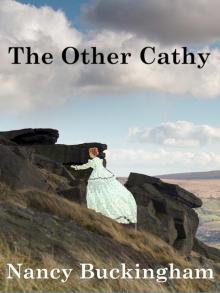 The Other Cathy
The Other Cathy Design for Murder
Design for Murder Valley of the Ravens
Valley of the Ravens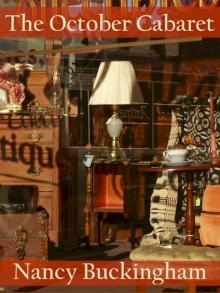 The October Cabaret
The October Cabaret Model Murder
Model Murder Murder in the Cotswolds
Murder in the Cotswolds Deadly Deceit
Deadly Deceit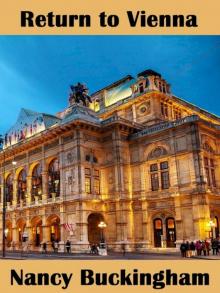 Return to Vienna
Return to Vienna Shroud of Silence
Shroud of Silence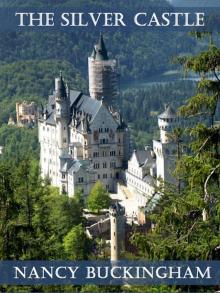 The Silver Castle
The Silver Castle A Cotswolds Legacy
A Cotswolds Legacy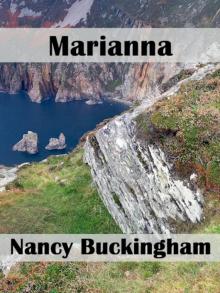 Marianna
Marianna Cold Coffin
Cold Coffin Kiss of Hot Sun
Kiss of Hot Sun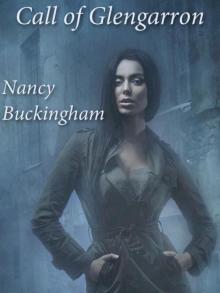 Call of Glengarron
Call of Glengarron Quest for Alexis
Quest for Alexis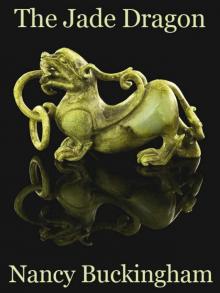 The Jade Dragon
The Jade Dragon